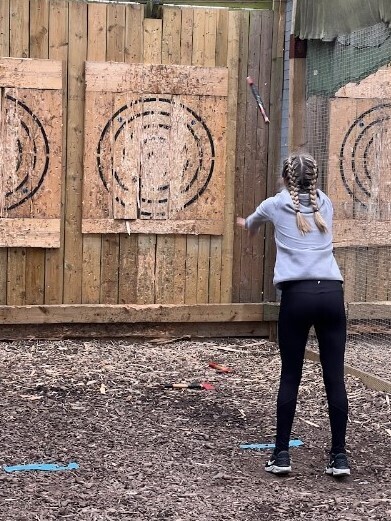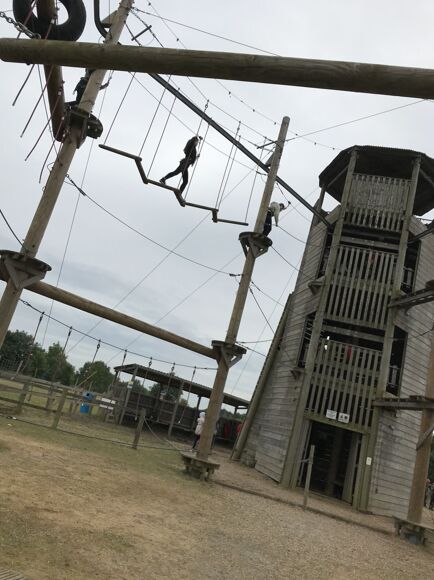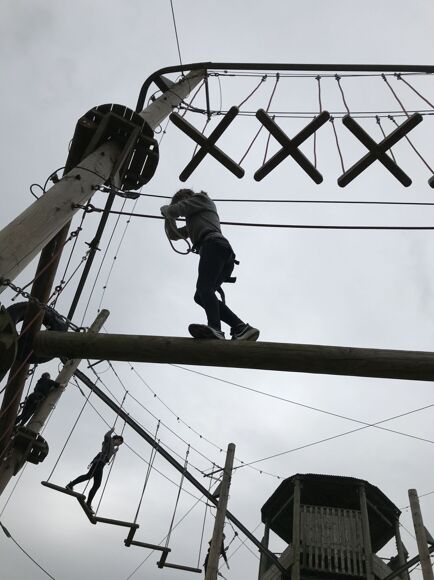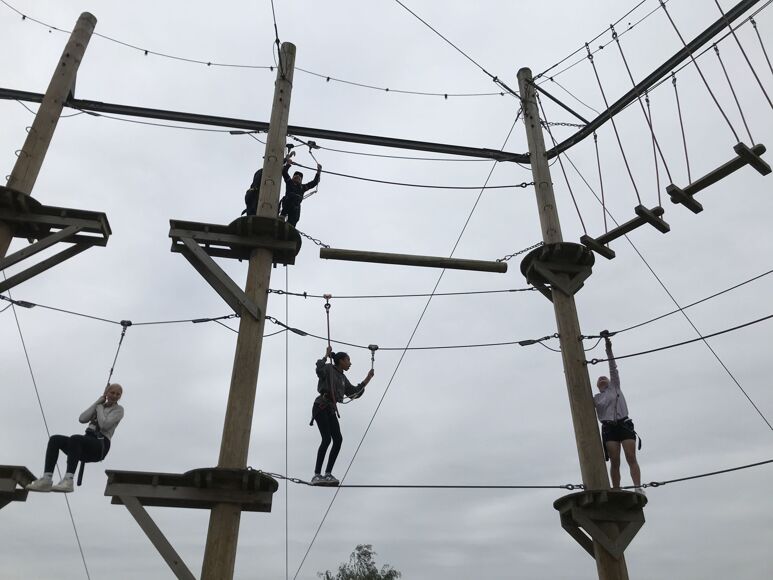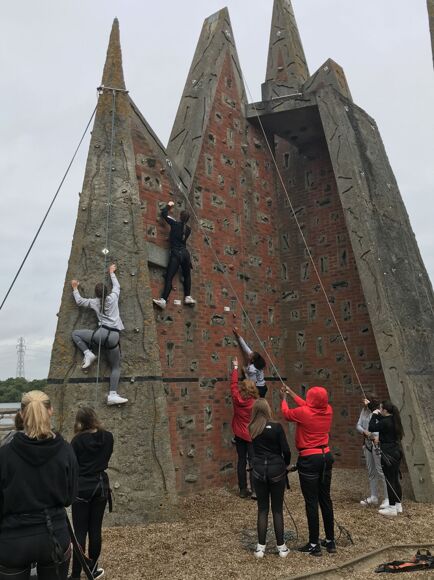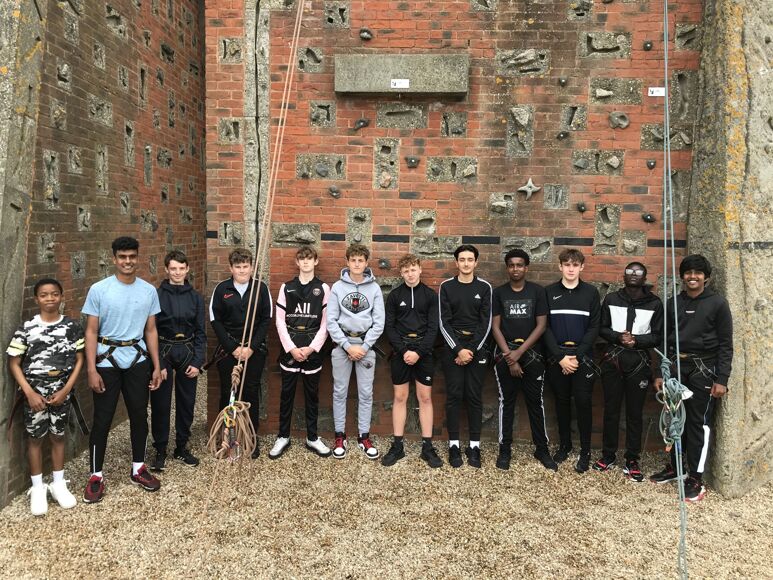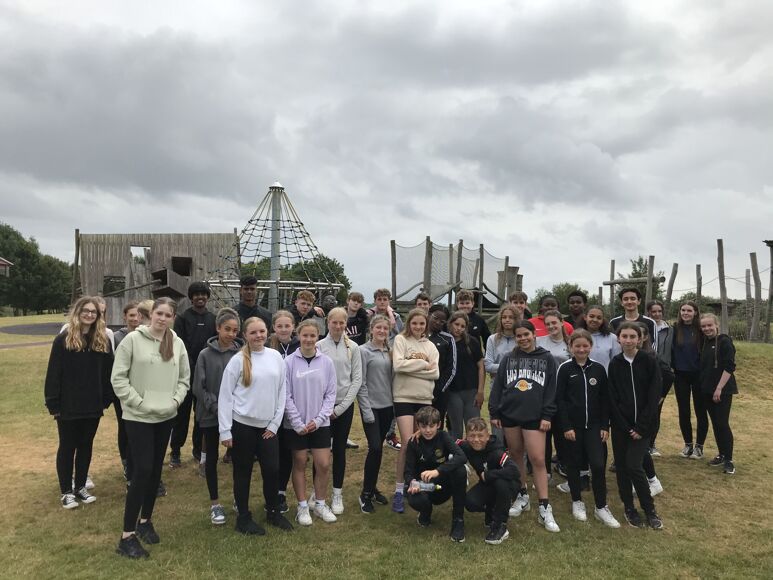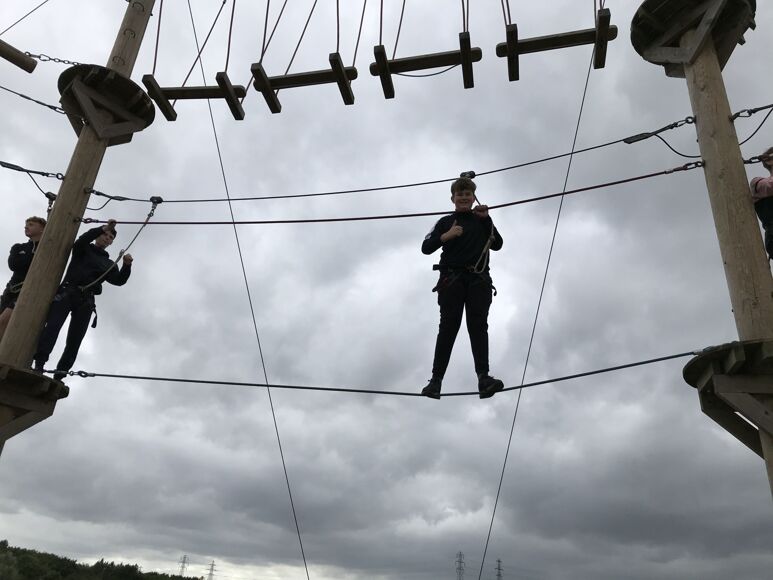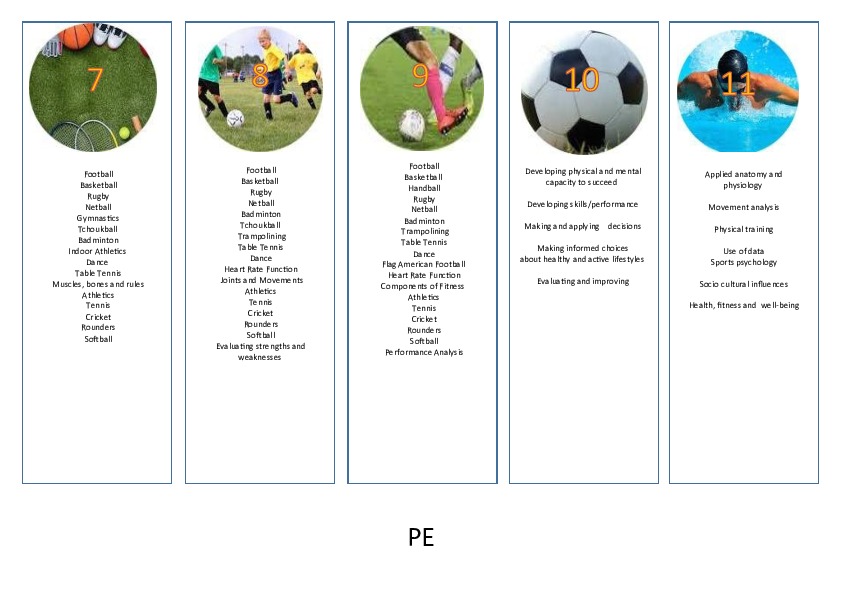- Home
- Secondary
- Subject Information
Physical Education
Back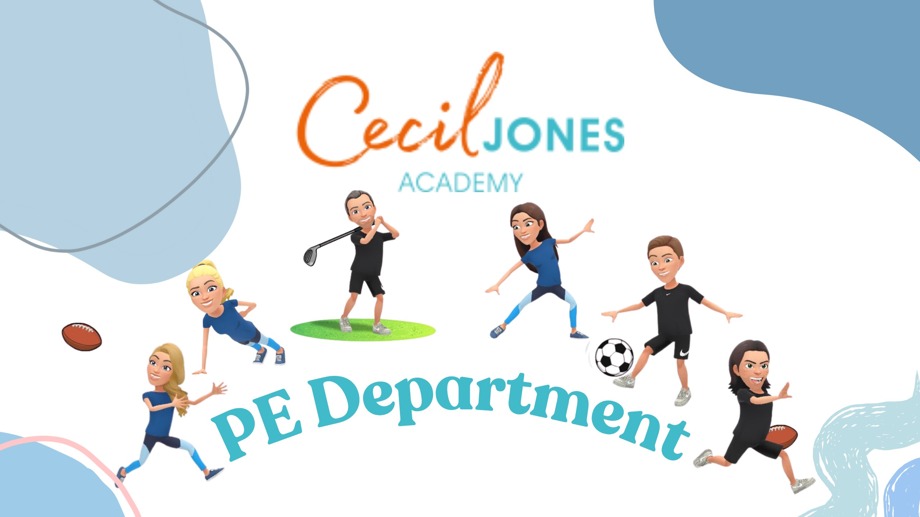
Introduction
“Health: A complete state of physical, emotional and social wellbeing not just the absence of disease or infirmity”
At Cecil Jones Academy we believe that physical education holds the key to developing healthy young people who are ready to take on all aspects of education and life both inside and outside of the classroom.
Our curriculum provides students with the opportunity to develop their confidence and competence in a variety of skills and across a broad range of sports.
The department consists of six highly dedicated members of staff who have a wealth of experience and are always willing to go above and beyond to support our students. The opportunities are not just limited to the classroom and pupils’ enjoy the chance to compete at year group, borough and county level.
We believe that sustained periods of physical activity within a well-tailored curriculum where students have opportunities to work individually, in groups and in teams can stimulate and develop physical, mental and social competencies.
Facilities available include a sports hall, fitness suite, dance studio, netball courts, AstroTurf and playing fields.
Our expectations:
Our subject area seeks to develop the following in all our students:
- Develop skill sets across a broad range of physical activities
- Ensure students are physically active for sustained periods of time by
- Taking a full and active part in every lesson
- Taking personal responsibility for their learning including being properly prepared for all lessons with full kit (this can be found on the school uniform page on the website)
- Foster a life-long enjoyment for sport and physical activity
- Provide a platform for students to compete to a high standard in intra and interschool sport
- Develop awareness of personal fitness and health, understanding the importance of leading a healthy, active lifestyle
PE code of conduct:
- Participate in all lessons as an active participant. If you are unable to take a full part in the lesson for any reason you need a signed note from home. However you must still get changed into your PE kit.
- A range of non-playing roles can be undertaken within lesson including scoring, officiating or umpiring.
- Wear full and correct Cecil Jones Academy kit
- Stay out of all store cupboards and leave all equipment until asked to enter/use equipment by a PE teacher
- Respect and take care of equipment, returning it safely and correctly to the appropriate place as changing rooms will not be opened until this happens.
PE Kit
| PE Polo Shirt | Navy with the Cecil Jones Academy embroidered logo |
| PE Joggers (optional) | Navy with the Cecil Jones Academy embroidered logo |
| PE Shorts | Navy (Plain) |
| PE Fleece Jacket | Navy with the Cecil Jones Academy embroidered logo |
| PE Rugby Shirt (optional) | Navy and Sky |
| PE Socks | Winter – Long white football socks (plain, no logos or branded)
Summer – Short white sports socks or long white football socks (plain, no logos or branded) |
| Footwear | 3G Facility- Appropriate Footwear |
3G Facility- Appropriate Footwear
As you may be aware, the Academy is delighted to have opened its new facilities, which include a brand new 3G surface. To ensure the longevity of the facility and the safety of all users, it is essential that students wear the correct footwear. Only appropriate 3G-compatible boots with moulded or screw-in studs should be worn—trainers, flat-soled shoes, and metal studs are not permitted. Please see the images below for reference.
Students wishing to use the 3G pitch for lunchtime and after-school clubs must bring the correct footwear to school with them. Unfortunately, those without suitable boots will not be able to participate on the surface for clubs.
We understand that not all students will have these currently, and the school does hold a small number of appropriate footwear that can be borrowed for lessons only, and this process will be managed by the PE department.
We appreciate your support in helping us maintain this fantastic new facility. If you have any questions about the required footwear, please do not hesitate to contact us.
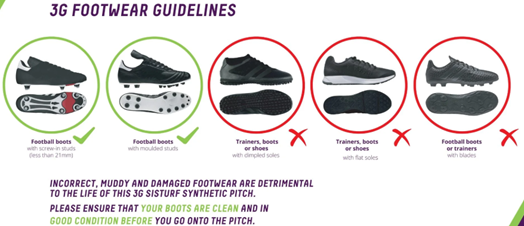
Key Stage 3
At key stage 3 pupils will take part in up to three hours of PE a week as part of their timetabled lessons, experiencing a diverse range of physical activities and sports. We aim to build on students’ understanding of how to execute skills, use tactics and learn correct techniques. Facilities available include a sports hall, fitness suite, dance studio, netball courts, astroturf and playing fields.
All pupils at KS3 will be taught using Key Concepts:
- To develop physical and mental capacity to succeed
- Develop skills and performance
- Improve decision making skills
- Make informed choices about healthy and active lifestyles
- Evaluate and improve performance levels.
These concepts will be applied through sports from 5 spheres:
- Net/wall games
- Team/invasion games
- Dance and trampolining
- Striking and fielding activities
- Health related fitness activities
Across this range of sports pupils should be able to:
Develop skills in physical activity
- Refine and adapt skills into techniques.
- Develop the range of skills they use.
- Develop the precision, control and fluency of their skills.
Pupils should be able to: Make and apply decisions
- Select and use tactics, strategies and compositional ideas effectively in different creative, competitive and challenge-type contexts.
- Refine and adapt ideas and plans in response to changing circumstances.
- Plan and implement what needs practising to be more effective in performance.
Pupils should be able to: Develop physical and mental capacity
- Develop their physical strength, stamina, speed and flexibility to cope with the demands of Different activities.
- Develop their mental determination to succeed.
Across the key stage students will apply these principles across a range of sports which are outlined below:
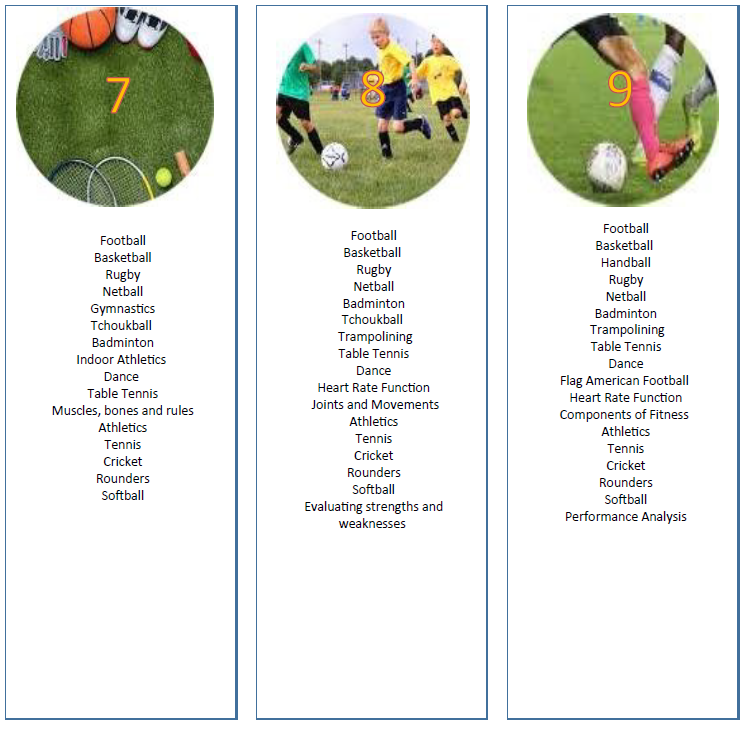
Key Stage 4
Core Physical Education
During years 10 and 11 students will enjoy one core PE lesson per week. The aim at key stage 4 is to provide students with a platform to continue to lead a healthy, active lifestyle beyond their school years. The emphasis is on positive engagement with and enjoyment of being physically active and therefore there is a 100% participation policy.
Students will be able to choose from a range of activity programmes on a half termly basis. These programmes will include team sports, individual games and health/fitness related activities. The department often consult pupils via student forums in order to keep the offering current, enjoyable and fit for purpose. We believe that in order for students to truly enjoy their physical education everyone needs to be pulling together in the same direction as part of one team.
GCSE Physical Education: Edexcel
Course Structure:
Theory – 60% Two External Examinations
Coursework- 10% Internally Assessed/Externally Moderated
Practical- 30% Internally Assessed/Externally Moderated
GCSE PE is open to all students but it is best suited to those with a good command of scientific concepts and who have regularly competed at school level or play for sports clubs externally. It is essential that students have shown enthusiasm for the subject throughout KS3 including full participation and appropriate behaviour.
Practically, students will continue to develop on the sports experienced at KS3. If students compete outside of school in a sport not offered by the school i.e. equestrianism, rock climbing, boxing, karate then it is important that staff members are made aware of this so that provisions for practical assessment can be made.
The largest and most important aspect of the course is the theory content which will account for 60% of the overall grade, consisting of two exam papers and covers the following areas:
Applied anatomy and physiology and Physical training (34%) 1hr30mins:
- Structure and function of the 4 major body systems
- Movement analysis
- The effects of exercise on the body systems
- Components of fitness
- Applying the principles of training
- Methods of training
- Prevention of injury
Socio-cultural influences Sports psychology Health, fitness and well-being (26%): 1hr15mins
- Engagement patterns of different social groups in sport
- Commercialisation of physical activity and sport
- Ethics, drugs and violence in sport
- Sports psychology
- Health, fitness and well-being
The second part of the course is practically based and weighted at 40%. Students will be assessed in 3 activities from a range of sports on the agreed assessment list produced by the exam board (please see below for link). Each sport is assessed and an overall practical score is generated. Students will be expected to be able to maintain their level of performance throughout the two years of the course and may be required to take part in the externally moderated practical assessment. There is also an analysis and evaluation of performance where students will be expected to conduct fitness tests and plan and carry out a suitable personal exercise programme for improvement in a specific sport based on their findings. This is coursework based and will account for 10% of the final grade.
Recommended GCSE websites:
- BBC Bitesize- https://www.bbc.com/bitesize/examspecs/ztrcg82
- Edexcel Specification- https://qualifications.pearson.com/en/qualifications/edexcel-gcses/physical-education-2016.html
Recommended GCSE texts or revision guides:
Revise Edexcel GCSE (9-1) Physical Education Revision Guide:
Language: English
- ISBN-10: 1292135123
- ISBN-13: 978-1292135120
Edexcel GCSE (9-1) PE Student Book 2nd editions (Edexcel GCSE PE 2016) Paperback – 22 Mar. 2016
Language: English
- ISBN-10: 1292129883
- ISBN-13: 978-1292129884
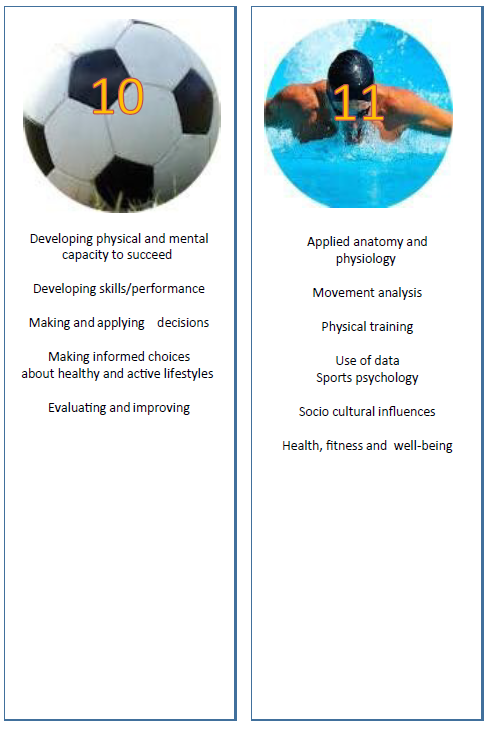
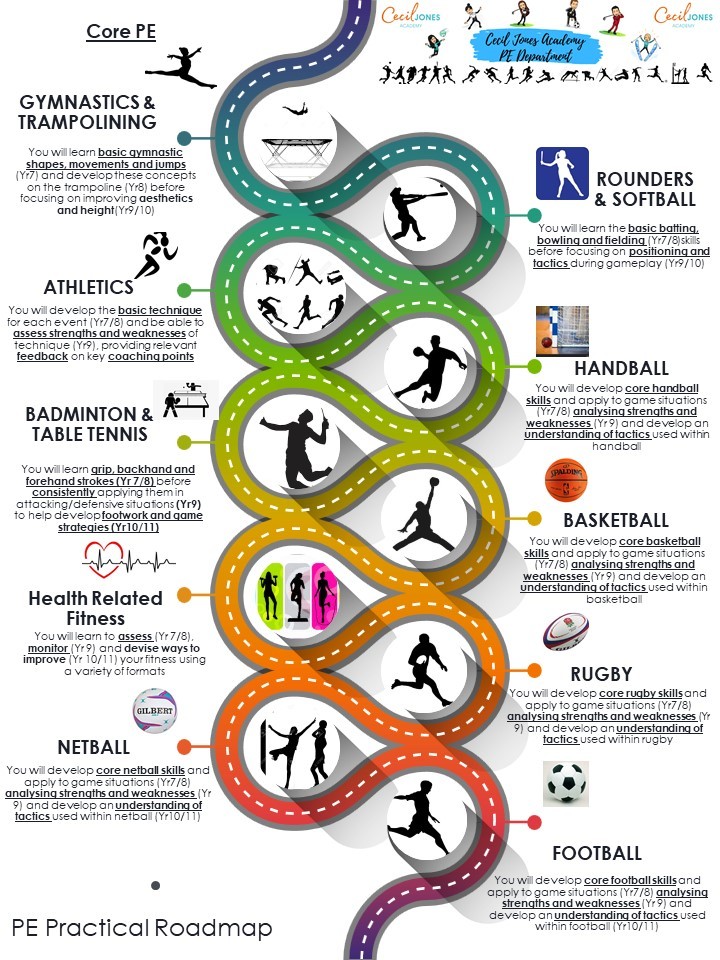
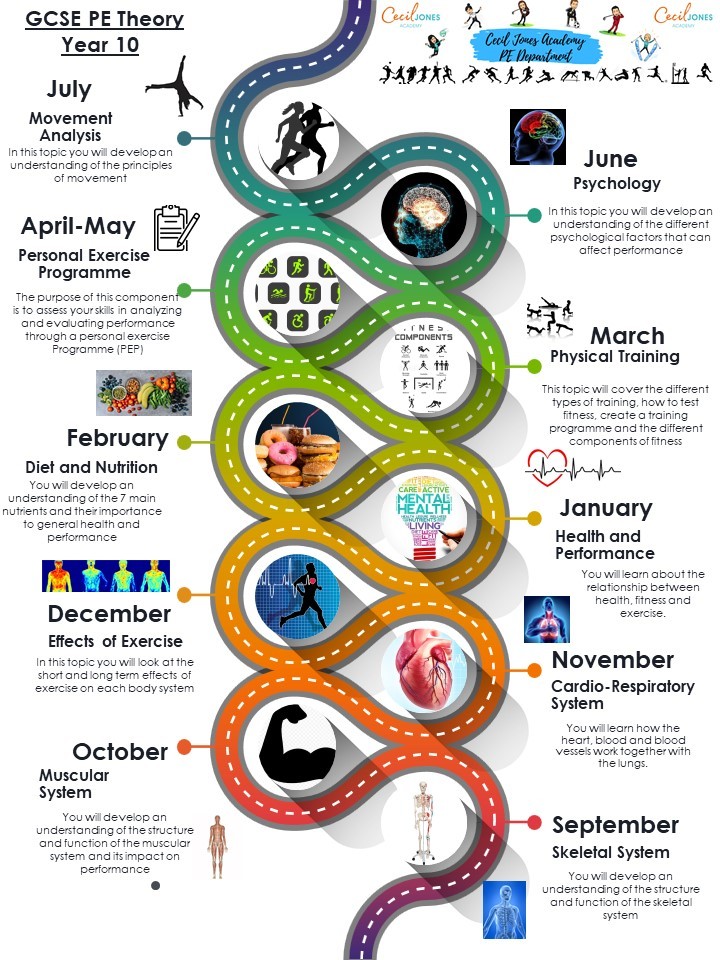
Visual Curriculum Map
Assessment
Students will complete two units (sports) each half term and will be assessed for each one after a block of 6-8 lessons. Practical assessment will help formulate an overall working at grade in PE which will be relayed via the reporting schedule. Regular extra-curricular clubs will run to allow students to improve their skill and technique as well as potentially going on to represent the Academy. Clubs include football, rugby, netball, basketball, trampolining and badminton among others.
Useful Links
BBC Bytesize: https://www.bbc.co.uk/bitesize/examspecs/zxbg39q
Edexcel specification: https://qualifications.pearson.com/en/qualifications/edexcel-gcses/physical-education-2016.html
Careers
Trips
During your time at Cecil Jones the PE department will look to run a number of trips that reward students for their positive engagement in PE and school sport and look to provide lifelong memories and enrichment opportunities.
The department runs a yearly rewards trip to Stubbers Adventure Centre for those students that regularly participate in clubs, fixtures and show an all around positive attitude towards PE. There are also rewards trips to The O2 to see the British Basketball Playoff Finals, The Copperbox to see London Lions basketball as well as trips targeted at raising aspirations to the sports campus of St Marys University in Twickenham.
